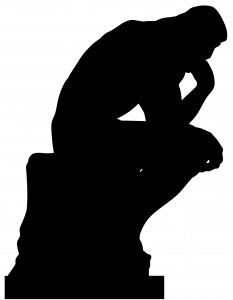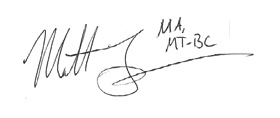In a quaint Thai restaurant, over a meal of tofu and stir-fried vegetables, I had a philosophical conversation with John Rapson, my good friend and former jazz instructor. John brought up the topic of convictions, and what it means to have them and to live accordingly. It really got me thinking, especially as I am preparing to make some big life changes. Sure, moving to California represents a geographical change for me. But I suspect (or hope, at least) that it will also come with intellectual, maybe even spiritual, growth.
The conversation was far too deep to fully report here, and, to be honest, I think I’m still cognitively digesting some of it. However, I took some important points and I’ve tried to apply them to my life and upcoming changes. I realize this is only loosely related to music therapy, but I think this “exercise in convictions” is important for anyone in any field. Before I get too far, let me first say that I am, at best, only an amateur philosopher. I spend a great deal of time thinking and reading about how to live, but I don’t have the razor sharp and lightening quick thinking skills possessed by those with much greater knowledge of the literature. Let me also say that I am not presenting John’s ideas here verbatim; just my reflections and (possibly incorrect) interpretations.
Let’s start by defining a conviction. In this case, we’re talking about strong personal beliefs. We could also say it’s something you are “convinced of”. For simplicity’s sake, let’s identify two types of convictions. The first has an external source. It is based on the experiences and beliefs of others and is passed along through teaching (passive or active) and/or indoctrination. This can be a good thing or a bad thing, and I’m sure you can think of examples of both. The second type is more internally constructed, and is based on personal experiences and attributes. This second type tends to be more flexible and fluid, as you are constantly gaining new experiences and encountering different ideas.
John and I talked about the importance of identifying convictions, and especially, questioning them. I have found that identification can be kind of tough, especially since we encounter so many suggestions about what those should be, either from the people we are close with or from the various forms of media to which we expose ourselves. You might start by asking yourself these questions:
When am I the happiest and most vibrant version of myself?
When am I most fulfilled?
When does my body feel the best?
Which people in my life give me the most energy? Why?
When do I feel the strongest sense of purpose?
When do I feel the most creative?
And conversely, you might ask yourself:
When am I the most unhappy version of myself?
When do I feel purposeless?
When does my body feel the worst?
Which people in my life suck energy from me?
When do I feel creatively depleted?
The answers to these questions are not in and of themselves convictions. But they start to expose your internal beliefs about yourself and about the way the world works. For example, if I identify that I feel the most fulfilled when I am interacting musically with a sick child and helping him reduce pain, a related conviction might be the belief that music is a powerful and effective tool for connecting with people and improving their life situations. Each case in which I experience this fulfillment serves as evidence in support of this conviction, and reinforces it. Of course, certain experiences might cause me to question it, which isn’t necessarily a bad thing. Questioning might result in a greater confidence, or it may result in an adaptation of a previous belief. Or, in some cases, the conviction may unravel entirely based on the accumulation of contrary evidence.
In some ways, building a life based on your convictions seems obvious. I would guess that many music therapists share the conviction illustrated in the previous paragraph, and are thus expressing it through their careers. But sometimes we ignore importance pieces of evidence that should shape our convictions. For example, if I acknowledge that my body feels the best after eating a giant bowl of organic salad (instead of the leftover spicy Hawaiian pizza I just ate), I should let that influence any convictions I have regarding eating habits. Or, if I find that I am happiest when interacting with people in person, maybe I ought not spend 3 hours a day on FaceBook.
And this brings us to the tough part: living according to our convictions. This can be incredibly difficult. If I feel creative and purposeful when I’m writing music, why is it so much easier to watch an episode of some lousy TV show? If I feel healthy when I eat a ton of veggies, why does that reuben look so damn delicious? Why do I answer the phone when my emotionally draining and self-absorbed “friend” calls me to hang out? I don’t have an answer to these questions, although we could spend all day hypothesizing. For whatever reason, we seem to be wired to fall short of our potential.
What makes sense to me, at this point in my life, is that living effectively demands good planning. The fact of the matter is that there are just too many distractions that can draw us away from, negatively influence, or even supplant, our deepest convictions. We need to have a plan for when those distractions arise.
Unfortunately, I don’t have any advice. But, I’ll share my strategy for living up to my convictions. Over the last several years, I’ve had many internal dialogues about what is important to me. I also find it helpful to write them out. I’ve had periods in which I was very successful in living accordingly, and periods in which I was pretty bad at it. Now I try to routinely reevaluate my convictions, and even question them. I also find it helpful to talk with others, especially those who have different convictions. I have found that respectful discussion, even debate, has helped me to articulate my beliefs more clearly, often because it has forced me to clean up and clarify my thinking. It has also, in some cases, forced me to tweak my convictions and adapt, and I see this as a good thing. So I guess I can say that my plan for intellectual growth is to constantly define, question, and redefine my convictions, while refining my strategies for living up to them.
Wow, this was a very long post. If you made it this far, thank you! I would like to know – what are your convictions? What are your strategies for living up to them? How do you respond when they are challenged, and how do you help others discover and refine their own convictions?
Have a great week!
